SCRS 2023 Site Landscape Survey: The challenge & opportunity of long-term record retention for clinical trial sites
Are Clinical Research Sites missing out on a key differentiator and value-add for their sponsors and CROs?
Clinical trial sites are facing an increasing challenge of what to do with long-term records generated throughout the clinical trial process.

While the regulation of clinical data archiving and records management varies by geography and indication, sites often find themselves contractually bound by sponsors and CROs to hold records for anywhere between 10 and 30 years (or longer) after the study has closed.
The SCRS (Society for Clinical Research Sites) recently published their 2023 Site Landscape Survey in which they covered record retention for the first time.
They found that the majority of sites (60%) felt uncomfortable with long-term archiving which is likely leading to over 70% not wanting to offer long-term document storage to the sponsors and CROs they are engaged with. In addition, many sites cited a lack of budget support to cover long-term storage, an area which will need significant rethinking in the future.
But is there an opportunity for the sites when it comes to record retention?
On the flip of the above stat, there are still a significant number of sites that do understand that offering a record archiving service would deliver added value and could become a key differentiator in their service offering to sponsors and CROs (if they can overcome the lack the tools and funding to make their dreams a reality!).
Retaining records for +25 years
As the life sciences industry moves away from paper towards digital records, the challenges of how to ensure that these records are safe, accessible and usable for the long-term shifts. Recently in the news we saw the perils of not keeping paper records safe with hundreds of patient medical records lost at NHS Grampian. Managing digital records though, requires a slightly different approach.
Things to consider include hardware degradation, technological obsolescence (both hardware and software), mitigating against data loss and corruption and maintaining consistent long-term access.
An effective approach requires the right mix of technology, process, and expertise to ensure that digital records endure for the entire retention period.
Arkivum works with a range of life sciences organisations and can support clinical research sites, site networks and NHS Trusts. Our digital archiving and preservation solution can reduce internal costs, enhance site service offerings to sponsors and CROs and help them become operationally proficient in their records management processes, all while improving and maintaining GCP compliance.
Sandra Blake, Corporate Records Manager for Barts Health NHS Trust (and Arkivum customer), said on the topic:
“Barts conducts a lot of research, and my service stores the records of closed studies for at least 25 years. Up until 2022 we had only ever accepted paper records, but around 2020 there were increasing numbers of requests to accept digital records too.
Not having an approved digital archive meant we couldn’t accept them; we were unable to provide a full service and didn’t have any oversight of the digital records. This created problems for research staff and sponsors and was logged as a high-scoring risk at Trust level.
We used a risk-based approach to procure Arkivum’s system. Now that we have an approved digital archive in place, we’ve been able to completely mitigate the risk and accept hybrid (paper and digital) transfer requests. It’s very satisfying to know that we can now provide a full, long-term records storage service that meets all the required standards.”
In Conclusion
As David Vulcano, SCRS Honorary President stated in their report, “If you’re keeping the records for 25 years past the regulatory period, you’re now a record storage vendor for the sponsors and CROs.”
The challenge of long-term record retention and data management will be an unavoidable truth for clinical trial sites in the years ahead. Those who adapt now will get ahead of the competition by improving their internal processes and delivering a better service to their sponsors and CROs.
If you like to discuss any of the topics that I’ve covered in this post please do email me at Sam.Rolfe@Arkivum.com.

Sam Rolfe
Sam Rolfe is a Business Development Director at Arkivum. He joined in 2023 and is passionate about how 'true cloud' SaaS solutions help drive Life Sciences companies to bring drugs and devices to patients faster with greater efficiency, safety and compliance, while reducing the overall cost of development.
Get in touch
Interested in finding out more? Click the link below to arrange a time with one of our experienced team members.
Book a demo
